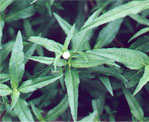



One of the Ten Auspicious Flowers (Dasapushpam), it has been used in cosmetic preparations for hair and skin since ancient times and is a well-regarded remedy in Ayurvedic medicine. It is the source of a black dye used for the hair and is thought to impart a glowing complexion. The leaves are used as food in Java.
It is a common weed growing throughout India on waste ground, up to an altitude of 2000 m.
An erect or prostrate, much-branched annual herb. Leaves are opposite with appressed hairs on both surfaces, sessile to subsessile, up to 10 em long. Composite flowers are white with compressed rays.
Whole plant, roots, seeds and seed oil.
The herb is used particularly for alopecia, ringworm and as a hair dye and for liver and spleen enlargement, hepatitis and jaundice and as a general tonic. It has been used for catarrh, cough, enterorrhagia, haemorrhage, indigestion, vertigo, to aid parturition and for toothache, giddiness and as an antiseptic and wound-healing agent. The root is used as an emetic and purgative and a paste of leaves is considered to be an excellent remedy for scorpion sting.
The leaves, herb and root are used for wounds, blisters, broken horns, cracked tail, scratching, scabies, abscess in the ear, haemorrhagic septicaemia, mastitis, rabies, jackal bites, glossitis, oral lesions, jaundice, leeches in the nostril, pneumonia, swelling of the throat and nasal mucus membranes, epistaxis and tetanus.
Six new oleanane glycosides, the eclalbasaponins I-VI, as well as ?-amyrinand other sterols have been isolated from the aerial parts.
Apigenin, luteolin and their glucosides have been isolated from the leaves and stem; and the isoflavonoids wedelolactone, desmethylwedelolactone and its 7-0-glucoside from the whole plant.
Ecliptal, a terthienyl aldehyde, has been isolated from the whole plant and L-terthienyl methanol and wedelic acid from leaves and stem, and the diterpene lactone columbin.
Antiinflammatory activity: An extract of Eclipta alba, tested in both acute and chronic antiinflammatory models, inhibited chronic inflammation up to 58.67%. Antinociceptive activity: In mice, a hydroalcoholic extract inhibited acetic acid-induced writhing by 35-55%, at a dose of 200 mg/kg PO. At the same dose, the effect ranged from 41 % to 77% using the formalin test in mice, and the extract preferentially inhibited the second phase of the response.
Hepatoprotective activity: An ethanol:water 1: 1 extract was studied in carbon tetrachloride-induced hepatotoxicity in rats and it was found that the extract provided protection by regulating the levels of hepatic microsomal drug-metabolising enzymes. Eclipta alba exhibited activity in the same model when administered in combination with Phyllanthus niruri and curcumin (from Curcuma longa) at a ratio of 25: 15: 1 0 (Phyllanthus niruri:Eclipta alba:curcumin). Elevated levels of lipids in the liver and serum bilirubin were decreased and normalised. The preparation increased the levels of serum triglyceride, pre-?-lipoproteins and cholesterol and decreased levels of glycogen were elevated. An ethanolic extract of the fresh plant of Eclipta alba showed dose-dependent significant hepatoprotective activity in CCl4-induced liver damage in rats and mice with no signs of toxicity observed up to a level of 2.0 g/kg given either orally or IP in mice. In another study using albino rats, significant hepatoprotective action was observed at 100 mg/kg body weight. The hepatoprotective effects of the freeze-dried aqueous extract of the plant were also studied in acute hepatitis induced in mice by a single dose of CCl4 or acetaminophen (paracetamol) and in rats by ? -D-galactosamine. The extract showed significant inhibition of the acute elevation of serum transaminases induced by CCl4 in mice and by ? -D-galactosamine in rats, but no significant improvement was observed in acetaminophen-induced liver damage.
Hypotensive activity: A mixture of polypeptides from Eclipta alba exhibited hypotensive activity in dogs and columbin, isolated from the ethanolic extract of the whole plant, showed remarkable antihypertensive action on anaesthetised rats.
The maximum tolerated dose of the 50% ethanolic extract of the whole plant was found to be 1000 mg/kg body weight when given IP to adult albino mice.
Click here to buy this powder online.
Copyright © Krishna Herbal Company 2022. All Rights Reserved Powered By: Planet Ayurveda







